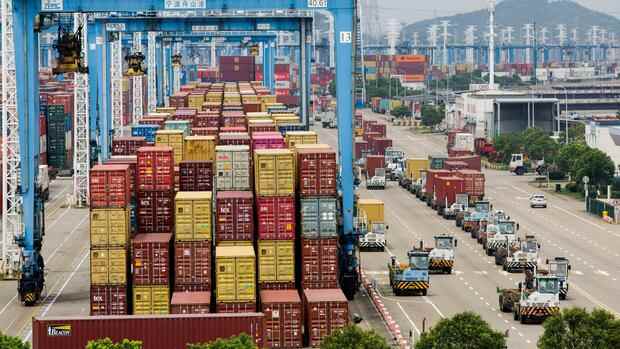Brussels In the dispute over the Chinese economic blockade against Lithuania, the European Union launched a counterattack. Due to China’s “discriminatory trade practices”, the EU has initiated proceedings against the People’s Republic before the World Trade Organization (WTO), the Commission writes in a brief statement.
The Chinese economic sanctions hurt Lithuanian exporters and also affect other member states, as they also target “products with Lithuanian content” exported from other EU countries, the Commission writes.
In the past few weeks, the EU had sought a diplomatic solution. EU Trade Commissioner Valdis Dombrovskis held talks with the Chinese government. But the efforts were unsuccessful. Now Brussels is sending a signal of solidarity to Lithuania – and directing clear words to China.
“Initiating a WTO case is not a step we take lightly,” Dombrovskis said. “However, after repeated failed attempts to resolve the issue bilaterally, we see no other way than to request WTO dispute settlement consultations with China.”
Top jobs of the day
Find the best jobs now and
be notified by email.
The EU is determined to take action against measures “that violate WTO rules and threaten the integrity of our internal market”. At the same time, the Commission is continuing its diplomatic de-escalation efforts.
The trade dispute stems from Lithuania’s decision to allow the Taiwanese government to open a representative office under the Taiwan name. China, which regards Taiwan as part of its national territory and wants to isolate the island internationally, sees this as a breach of a taboo.
Method: Maximum Uncertainty
All states that want to establish diplomatic relations with the People’s Republic must commit to the one-China policy and are not allowed to maintain official diplomatic contacts with the Taiwanese government. To defend this principle, China is using extreme and unconventional means against Lithuania.
An undeclared economic war is raging, with China trying to blast Lithuania out of Europe’s value chains. To do this, according to top European officials, China is trying to create maximum uncertainty. Sometimes Lithuania is deleted from the commercial register of the People’s Republic, sometimes it reappears at short notice.
In certain ports, individual containers with Lithuanian goods would come through at times, then they would be stopped again. Other ports remained completely closed.
The result is that no European exporter can be sure that his product will pass through Chinese customs, even if even a single component comes from Lithuania. In other words, the Chinese are targeting Lithuania but hitting the entire EU. In Brussels, the retaliatory measures are seen as an attack on the internal market.
In China’s economic war against Lithuania, the EU feels compelled to sue the country.
(Photo: AP)
German companies in particular are affected, above all the German car industry. Shortly before Christmas it became known that the government in Beijing was putting pressure on the German auto parts supplier Continental to stop using components manufactured in Lithuania.
There is some resentment among EU member states about Lithuania’s decision to shake up the One China policy. The step was not coordinated in the EU circle, and it is also seen as an unnecessary provocation in the federal government. Nevertheless, the EU is now clearly on the side of the Baltic country.
>> Read also here: The frictions between China and Europe are increasing
The fact that Franziska Brantner, Parliamentary State Secretary in the Ministry of Economic Affairs, recently traveled to Lithuania shows how important the topic is to the federal government. “It is our task to defend the internal market together,” the Green politician told the Handelsblatt.
EU strengthens trade policy arsenal
However, it is questionable whether the desired WTO procedure will impress the Chinese regime. It could be years before a verdict is reached. Lithuania can hardly withstand the economic pressure for that long. German companies are urging the government in Vilnius to give in and are campaigning for a “constructive solution” – out of concern for their supply chains.
In order to be better able to defend itself against attempts at blackmail in the future, the EU wants to strengthen its trade policy arsenal. In December, the Commission presented a concept for an “instrument against coercive measures”: If Member States and Parliament agree to the initiative, the Commission could in future respond to sanctions from third countries with its own sanctions.
So far, the consent of all EU countries has been required for countermeasures. A high hurdle that weakens Europe’s international position. France, which holds the presidency of the European Council at the turn of the year, has already signaled that it wants to press ahead with the Commission’s initiative.
More: “The Chinese have completely exaggerated”: EU foreign ministers discuss reaction to China’s trade war against Lithuania
